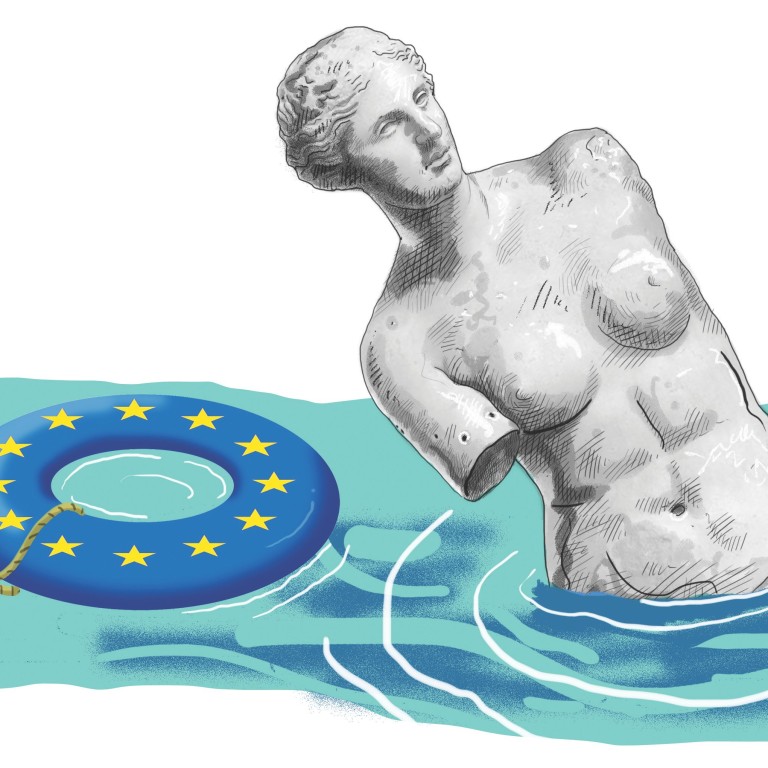
The farce of trying to keep Greece in the euro zone
Klaus Segbers says the EU has wasted too much time and effort on Greece already and a 'Grexit' may be best for everyone
Over the past few years, months, weeks and days, the European Union has been busy. By far the most time-consuming issue, though, has been one that should never have taken so much attention to start with: the drama in and around Greece.
Greece cheated its way into the EU (in 1981) and later, into the euro zone (2001), by cooking up budget and accounting data. Later, it belonged to a group of southern-tier countries (Portugal, Spain, Italy, to some extent France, and the not-very-southern Ireland), where budget discipline remained a fancy concept, and profligate spending habits were notorious. Banks were often undercapitalised, and labour market structures remained highly inflexible.
These facts were corroborated by hostile rhetoric against anybody reminding those governments of certain rules within the euro zone, and by producing narratives for domestic consumption insinuating that globalisation and its effects could be kept at bay by voting for populist parties.
While in the rest of these countries, sentiment cooled and decision-makers sobered up over time - with a little help from the European Central Bank (ECB), the European Commission and the International Monetary Fund - in Greece, it was an entirely different script. The traditional political parties, the socialist Pasok and the conservative New Democracy, were cooperating with these three organisations, then called the Troika. This cooperation cost them dearly, most of all in terms of credibility. The fruits promised as a result of a more austere policy (matching incoming and outgoing money) were materialising too slowly to convince voters that austerity was actually paying off. In connection with handy enemy images (the Troika, and the Germans - didn't they do "it" before, in the 1940s?), hostile external forces were identified. Now the main task was clear: instead of fighting wastefulness and corruption, external forces had to be coped with, endangering the "dignity" of the country.
German and other European newspapers responded, suggesting that Greece should "sell your islands" before asking the more orderly northern Europeans for help. Against this background, a coalition of very leftist and rightist populist parties won the election in January. Neither was inclined to implement colonial-style budget reforms in the country. Instead, they promised the Greek electorate that everything would work out nicely. But it didn't. The Greek government was, and is, broke. Without an informal lifeline provided by the ECB, a default would already have had to be declared openly a few months ago. The fact of the matter is that the other governments within the euro zone were complicit in a case of delayed insolvency.
Repeatedly, the media declared a "finally decisive meeting tomorrow in Brussels" - here, by the finance ministers, there, by bankers and the three organisations, or, more and more often, by the heads of governments themselves. Permanently, time was running out. But, at the same time, there has never before been such an abundance of time for a country. The summit meetings on June 26 and June 28 were the last acts in this drama (at the time).
What lies behind this farce, and the hesitancy of the 18 other euro-zone governments to call a spade a spade? In other words, why has Greece, finally, not simply been kicked out of the euro zone? After all, reintroduce the drachma (perhaps in parallel to some surrogate euro) and Greek imports, including food and medicine, would become more expensive (but subsidised by circumspect eurocrats). Exports, however, would boom, enabled by the new depreciated currency (instead by relying on an unrealistic internal devaluation of wages and pensions).
The most prominent reason is assumed contagion. Once Greece is out, so the reasoning goes, others may follow. Close behind is the fear that capital markets may become too volatile to be contained, and may produce another 2008-type crisis. We may disregard the fantasy stories, like "we have to defend Greece as the motherland of democracy" or "we have to accept the wish of Greek voters".
So what about the two more serious objections? The first, contagion, was a serious one a few years back. Today, there is no real fear that Portugal, Spain, Italy or others may be drawn into some kind of domino effect. Cyprus has already survived a default.
As for the capital markets, they are volatile, for sure. But the banks are in better shape than they were some time ago. Frankly, no one knows what will happen if and when the "Grexit" takes place. But what we do know is that continuing to throw good money after bad won't solve a thing.
What's more, it will send the wrong signal, and other actors, including governments, may conclude that the euro-zone rules can be ignored and violated without much harm. That may be the biggest danger right now.
On the contrary, in quite a few countries, difficult and hard-to-swallow programmes of adjustment have already been implemented, such as in Spain and Portugal (with good success), in the Baltics, and Slovakia. So how can one explain to the people there that they experienced hardship for their later successes, and should now sacrifice again for a country that tries to avoid more difficulties?
Now, after another "final" round of talks and negotiations, Greek Prime Minister Alexis Tsipras has decided to put to a referendum on Sunday the question of whether to accept a deal with the euro zone and the three organisations.
Be that as it may, the euro-zone partners' patience finally seems exhausted. On Sunday, negotiations between the EU and Greece were terminated. The European Central Bank credit line of just less than €90 billion (HK$774 billion) was not changed. Greek banks were closed, starting on Monday. Chances are that Greece will now have to look out for itself. And this may be the best solution for everyone.
